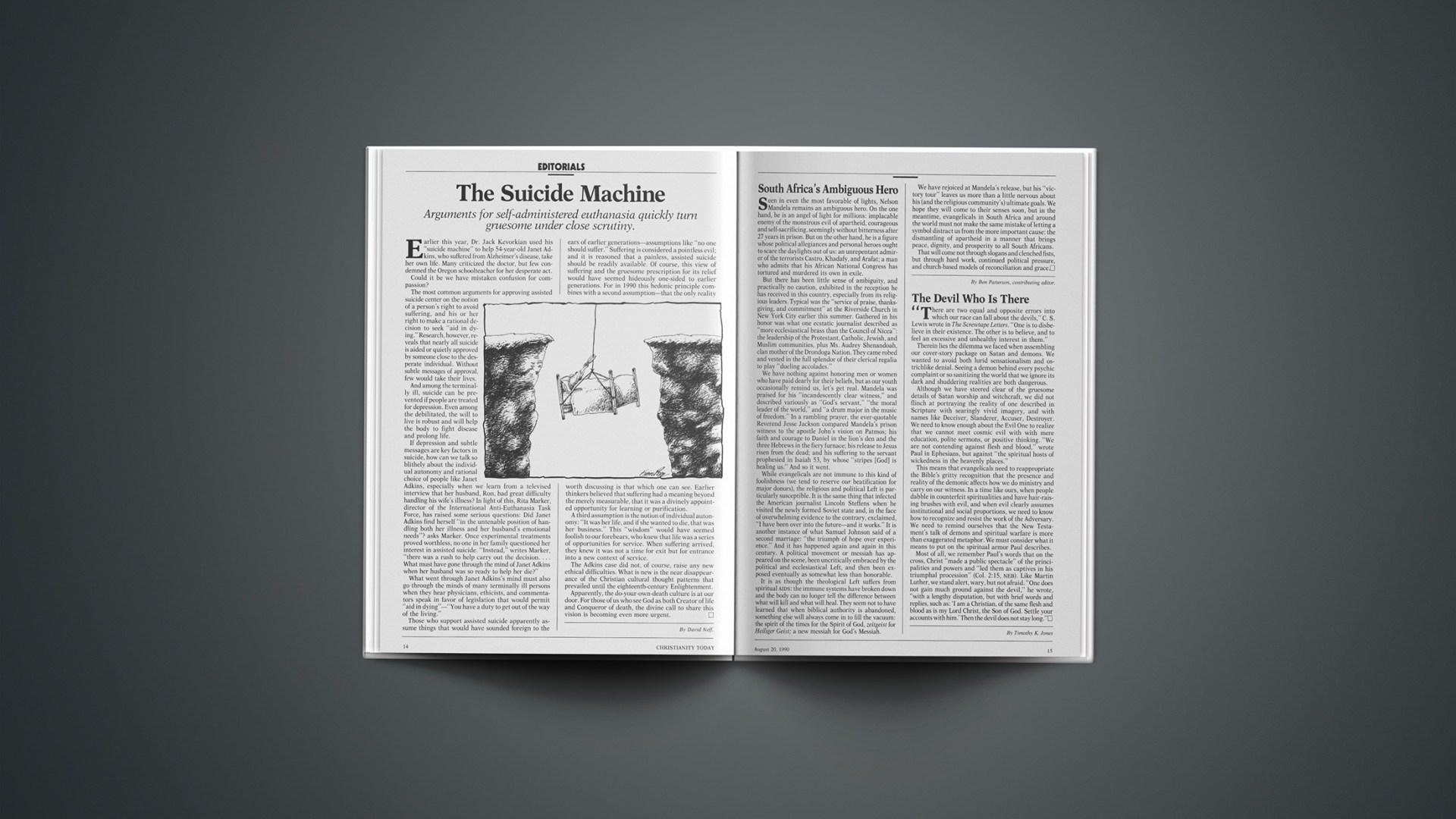Arguments for self-administered euthanasia quickly turn gruesome under close scrutiny.
Earlier this year, Dr. Jack Kevorkian used his “suicide machine” to help 54-year-old Janet Adkins, who suffered from Alzheimer’s disease, take her own life. Many criticized the doctor, but few condemned the Oregon schoolteacher for her desperate act.
Could it be we have mistaken confusion for compassion?
The most common arguments for approving assisted suicide center on the notion of a person’s right to avoid suffering, and his or her right to make a rational decision to seek “aid in dying.” Research, however, reveals that nearly all suicide is aided or quietly approved by someone close to the desperate individual. Without subtle messages of approval, few would take their lives.
And among the terminally ill, suicide can be prevented if people are treated for depression. Even among the debilitated, the will to live is robust and will help the body to fight disease and prolong life.
If depression and subtle messages are key factors in suicide, how can we talk so blithely about the individual autonomy and rational choice of people like Janet Adkins, especially when we learn from a televised interview that her husband, Ron, had great difficulty handling his wife’s illness? In light of this, Rita Marker, director of the International Anti-Euthanasia Task Force, has raised some serious questions: Did Janet Adkins find herself “in the untenable position of handling both her illness and her husband’s emotional needs”? asks Marker. Once experimental treatments proved worthless, no one in her family questioned her interest in assisted suicide. “Instead,” writes Marker, “there was a rush to help carry out the decision.… What must have gone through the mind of Janet Adkins when her husband was so ready to help her die?”
What went through Janet Adkins’s mind must also go through the minds of many terminally ill persons when they hear physicians, ethicists, and commentators speak in favor of legislation that would permit “aid in dying”—“You have a duty to get out of the way of the living.”
Those who support assisted suicide apparently assume things that would have sounded foreign to the ears of earlier generations—assumptions like “no one should suffer.” Suffering is considered a pointless evil; and it is reasoned that a painless, assisted suicide should be readily available. Of course, this view of suffering and the gruesome prescription for its relief would have seemed hideously one-sided to earlier generations. For in 1990 this hedonic principle combines with a second assumption—that the only reality worth discussing is that which one can see. Earlier thinkers believed that suffering had a meaning beyond the merely measurable, that it was a divinely appointed opportunity for learning or purification.
A third assumption is the notion of individual autonomy: “It was her life, and if she wanted to die, that was her business.” This “wisdom” would have seemed foolish to our forebears, who knew that life was a series of opportunities for service. When suffering arrived, they knew it was not a time for exit but for entrance into a new context of service.
The Adkins case did not, of course, raise any new ethical difficulties. What is new is the near disappearance of the Christian cultural thought patterns that prevailed until the eighteenth-century Enlightenment.
Apparently, the do-your-own-death culture is at our door. For those of us who see God as both Creator of life and Conqueror of death, the divine call to share this vision is becoming even more urgent.
By David Neff.
Seen in even the most favorable of lights, Nelson Mandela remains an ambiguous hero. On the one hand, he is an angel of light for millions: implacable enemy of the monstrous evil of apartheid, courageous and self-sacrificing, seemingly without bitterness after 27 years in prison. But on the other hand, he is a figure whose political allegiances and personal heroes ought to scare the daylights out of us: an unrepentant admirer of the terrorists Castro, Khadafy, and Arafat; a man who admits that his African National Congress has tortured and murdered its own in exile.
But there has been little sense of ambiguity, and practically no caution, exhibited in the reception he has received in this country, especially from its religious leaders. Typical was the “service of praise, thanksgiving, and commitment” at the Riverside Church in New York City earlier this summer. Gathered in his honor was what one ecstatic journalist described as “more ecclesiastical brass than the Council of Nicea”: the leadership of the Protestant, Catholic, Jewish, and Muslim communities, plus Ms. Audrey Shenandoah, clan mother of the Drondoga Nation. They came robed and vested in the full splendor of their clerical regalia to play “dueling accolades.”
We have nothing against honoring men or women who have paid dearly for their beliefs, but as our youth occasionally remind us, let’s get real. Mandela was praised for his “incandescently clear witness,” and described variously as “God’s servant,” “the moral leader of the world,” and “a drum major in the music of freedom.” In a rambling prayer, the ever-quotable Reverend Jesse Jackson compared Mandela’s prison witness to the apostle John’s vision on Patmos; his faith and courage to Daniel in the lion’s den and the three Hebrews in the fiery furnace; his release to Jesus risen from the dead; and his suffering to the servant prophesied in Isaiah 53, by whose “stripes [God] is healing us.” And so it went.
While evangelicals are not immune to this kind of foolishness (we tend to reserve our beatification for major donors), the religious and political Left is particularly susceptible. It is the same thing that infected the American journalist Lincoln Steffens when he visited the newly formed Soviet state and, in the face of overwhelming evidence to the contrary, exclaimed, “I have been over into the future—and it works.” It is another instance of what Samuel Johnson said of a second marriage: “the triumph of hope over experience.” And it has happened again and again in this century. A political movement or messiah has appeared on the scene, been uncritically embraced by the political and ecclesiastical Left, and then been exposed eventually as somewhat less than honorable.
It is as though the theological Left suffers from spiritual AIDS: the immune systems have broken down and the body can no longer tell the difference between what will kill and what will heal. They seem not to have learned that when biblical authority is abandoned, something else will always come in to fill the vacuum: the spirit of the times for the Spirit of God, zeitgeist for Heiliger Geist; a new messiah for God’s Messiah.
We have rejoiced at Mandela’s release, but his “victory tour” leaves us more than a little nervous about his (and the religious community’s) ultimate goals. We hope they will come to their senses soon, but in the meantime, evangelicals in South Africa and around the world must not make the same mistake of letting a symbol distract us from the more important cause: the dismantling of apartheid in a manner that brings peace, dignity, and prosperity to all South Africans.
That will come not through slogans and clenched fists, but through hard work, continued political pressure, and church-based models of reconciliation and grace.
By Ben Patterson, contributing editor.
“There are two equal and opposite errors into which our race can fall about the devils,” C. S. Lewis wrote in The Screwtape Letters. “One is to disbelieve in their existence. The other is to believe, and to feel an excessive and unhealthy interest in them.”
Therein lies the dilemma we faced when assembling our cover-story package on Satan and demons. We wanted to avoid both lurid sensationalism and ostrichlike denial. Seeing a demon behind every psychic complaint or so sanitizing the world that we ignore its dark and shuddering realities are both dangerous.
Although we have steered clear of the gruesome details of Satan worship and witchcraft, we did not flinch at portraying the reality of one described in Scripture with searingly vivid imagery, and with names like Deceiver, Slanderer, Accuser, Destroyer. We need to know enough about the Evil One to realize that we cannot meet cosmic evil with with mere education, polite sermons, or positive thinking. “We are not contending against flesh and blood,” wrote Paul in Ephesians, but against “the spiritual hosts of wickedness in the heavenly places.”
This means that evangelicals need to reappropriate the Bible’s gritty recognition that the presence and reality of the demonic affects how we do ministry and carry on our witness. In a time like ours, when people dabble in counterfeit spiritualities and have hair-raising brushes with evil, and when evil clearly assumes institutional and social proportions, we need to know how to recognize and resist the work of the Adversary. We need to remind ourselves that the New Testament’s talk of demons and spiritual warfare is more than exaggerated metaphor. We must consider what it means to put on the spiritual armor Paul describes.
Most of all, we remember Paul’s words that on the cross, Christ “made a public spectacle” of the principalities and powers and “led them as captives in his triumphal procession” (Col. 2:15, NEB). Like Martin Luther, we stand alert, wary, but not afraid. “One does not gain much ground against the devil,” he wrote, “with a lengthy disputation, but with brief words and replies, such as: ‘I am a Christian, of the same flesh and blood as is my Lord Christ, the Son of God. Settle your accounts with him.’ Then the devil does not stay long.”
By Timothy K. Jones










